Watty wonderful world
After 23 years, English and songwriting teacher to retire
Watterson promoted the songwriting class at the Knight Expo elective fair on Feb. 27 by strumming a tune or two in the new gym.
Tom Watterson crossed the stage at his graduation from Chagrin Falls High School in Chagrin Falls, Ohio, on May 30, 1978. That year the Chagrin Falls Tigers had a graduating class of 227, one of the largest in the school’s history. Over 1,000 miles away and 40 years later, Watterson will be watching a class twice that size cross the stage of the Frank Erwin Center—the McCallum Knights Class of 2018, the last class of graduating seniors Watterson will ever teach.
“Graduation is going to be fun because I get to graduate, too,” Watterson said. “And coincidentally, I’m going to my 40th high school reunion the weekend before graduation, so there’s a certain full-circle thing that’s coming along here, that 40 years to the day after my graduation of high school I get to graduate high school again. And that feels kind of good.”
Watterson, who currently teaches AP senior English and songwriting, gets to “graduate” for a second time because unlike most teachers at McCallum, he won’t be returning in the fall.
“Watterson has been talking about [retiring] for two years now,” AP junior English teacher Eric Wydeven said. “[I’m] excited for him. He’s a young, healthy man so he gets to go and enjoy himself now. He’s put in his time. But also I’ll miss him. I think he’s a really important part of this campus and our English department, and he’s a great friend. I mean, Tom [and I], we’ve been eating lunch together for 10 years every day, and I’ll miss that.”
As a teacher for the past 23 years—12 of those at McCallum—Watterson’s departure won’t be an easy one for the friends he’s leaving behind or for himself.
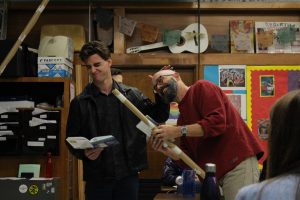
“I’m looking forward to doing something else for a while after 23 years, but there is a great deal of this career that I’m going to deeply miss,” Watterson said. “[Teaching] is all about the kids, hanging out with cool kids, cool creative kids all day, every day for 23 years. It’s not going to be easy to suddenly go live in the world of adults and to no longer have that connection with 130 adoring fans. I feel like I’ve managed to gain some sort of position here that I suspect my identity is more wrapped up in than I even can recognize, and that that’s going to [take] some adjusting to. At the same time, not having 130 things to deal with every day is going to be kind of nice.”
As someone who has taught more than 100 students a year for more than two decades, Watterson has extensive experience with large workloads. While this less-than-desirable aspect of the career has remained the same, the part that makes the work worthwhile for Watterson has only gotten better over time.
“I will say that the atmosphere of the student body and the attitudes of students have only improved in my 23 years,” Watterson said. “Especially in my experience here at McCallum. Kids are just a lot cooler than they were when I first started; they really are. I just remember, especially at Austin High School, just hearing slurs against people. Routinely people would be ridiculed for their sexual orientation, for their race, for their physical abilities and disabilities, and I just feel like [we’ve] become a more enlightened society, and I think that kids are sort of at the forefront of that. Kids used to be a lot meaner to each other. And they probably still are, to an extent, but I feel like the atmosphere in the building here is very accepting of one another, and I think that that’s sort of a McCallum thing anyway. But I’ve seen it increase even in the 12 years that I’ve been here.”
Watterson’s respect for open-mindedness isn’t hard to understand because it’s a principle he practices as a teacher and as a father. His son Sam graduated from McCallum in 2016.
“[Watterson] just comes in every day [and] he just regales us with his bicycle adventures and the things he’s doing,” Wydeven said. “And now his son is this hardcore punk rocker—sometimes during our lunch meetings we’ll listen to heavy punk rock [and] get a little angsty—[and] as a parent myself, I see the path that Sam, his son, is taking, and there’s some part of me that just admires his approach to it. He seems to stand behind Sam and push him to be whoever he’s going to be, and I think if that was my kid who was going into punk rock, I would be like, ‘Ah! Go get a job, make something of yourself, what’s this punk rock shit?’ And so I think it’s been inspirational to me as a parent, even, just [for him] to say, ‘Just let these folks take the road they’re going to take and encourage them and stand behind them and let them know you’re on their side and let the people be people.’ [I’m] always going to him with questions about, ‘Oh my God, I have this kid, I just don’t know what to do,’ and he’s always got some insight that again leaves it to us to kind of do whatever we’re going to do, but he always provides us with at least a calming, objective view of how we could approach something.”
Wydeven’s experiences also ring true with many students, including senior Abigail Tyree. In addition to being one of Watterson’s AP English students, Tyree is a peer tutor with the Writing Center, a group that Watterson sponsors.
“[Watterson] has made [my senior year] really fun,” Tyree said. “His is definitely the class where I feel most like an adult; I’m able to just talk about the things that matter in the book, and it’s not just like, ‘You have to memorize this, this and this to get to the final.’ It’s more like, ‘We’re going to talk about things that are going to impact your life in the future; we’re going to talk about these big ideas that are important.’”
The impact that Watterson has made on McCallum is evident from the amount of people who are conflicted about his departure—himself included.
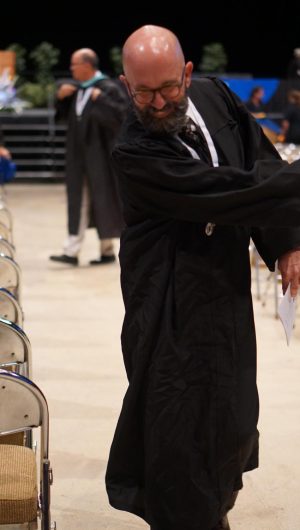
“I’ve reconsidered a bunch of times, and there are just some great days where I say, ‘How could I ever leave this?’ And there are some days when I say, ‘Let’s hurry up and get out of here!’” Watterson said. “So absolutely, I am not running out the door, fleeing like a senior to finally be free of this dump or anything like that. This is not necessarily a joyous occasion. While there is joy in the freedom that it’s going to offer me, there’s [also] a great deal of heaviness.”
Part of this heaviness comes from leaving behind the songwriting program, which Watterson inherited when he came to McCallum. At the time of publication, the administration hasn’t determined who the new songwriting teacher will be, but part of Watterson’s preparation for leaving has included making certain that the class will continue.
“I’ve been assured that it will still be a class, and it’s really important to me that it is,” Watterson said. “That’s one of the trademarks of McCallum High School, and it would be a real detriment to our general quality of life here to not have the songwriting class.”
Songwriting may no longer be in Watterson’s future, but with the free time that retirement will allow, writing certainly will be.
“I’ve always aspired to write,” Watterson said. “That’s sort of what I’ve done always along the way, and it will be nice to devote some time to doing some writing, whether that’s freelance or magazine work, or maybe I’ve got a novel in me, I don’t know. I just want to do something that doesn’t necessarily require me to be someplace at the same time every day from 9 to 5.”
Watterson may be retiring from McCallum, but he says that as long as he continues to live in Austin, he’ll have to continue to work.
“[My wife and I] love it here, and I’ve lived here for 40 years,” Watterson said. “[But] when you look at what it costs to live here, what our property taxes have turned into—we could be high rollers if we sold our house and moved to another, less expensive town. I wouldn’t have to work. And so on our travels in the coming year or so we are certainly keeping our eyes open to other possibilities, but what we really want to do is just turn back the clock and make Austin cheap again, because there’s nothing about this town that I don’t like besides the traffic and the expense. But we’d be leaving 40 years of established friendships and relationships behind, and it’s hard enough to leave a job, [but] to leave your town, I think, would be more difficult and painful than I’m able to imagine at this point.”
After 23 years in a career, the decision to retire isn’t one that comes easily, but Watterson’s reasons are compelling.
“It felt right, to a certain degree,” Watterson said. “Having gotten my own son through school, I sort of felt like, ‘been there, done that,’ and it just sort of felt right. And then sadly my wife’s brother passed away at my age last year. And he had never retired, and he and his wife had big plans that they never got to realize, and my wife and I decided that we didn’t want to defer our plans until, you know, we were 70. It’s like, we’re going to have a lot more fun doing the stuff we want to do at 60 than we will at 70. And his passing sort of put things into perspective and said [to us], ‘You know, if there are other things that you want to do in this life, now would probably be the better time to do it as opposed to later.’”
After May 31, Watterson will be able to find those things and pursue them. As for McCallum, things will remain the same. Guitars will be strummed softly in the halls, the patter of mice will be heard when it’s just quiet enough, half-finished paintings will fade on the walls of classrooms and a different procession of blue robes will cross the stage each year—except they won’t be Watterson’s songwriting students playing, or the mice that he crusades against, or the paintings that loom over his cluttered desk, or the seniors whom he has cultivated. In the end, Wydeven puts it best:
“There’s only one Tom Watterson.”
Your donation will support the student journalists of McCallum High School. Your contribution will allow us to purchase equipment and cover our annual website hosting costs.


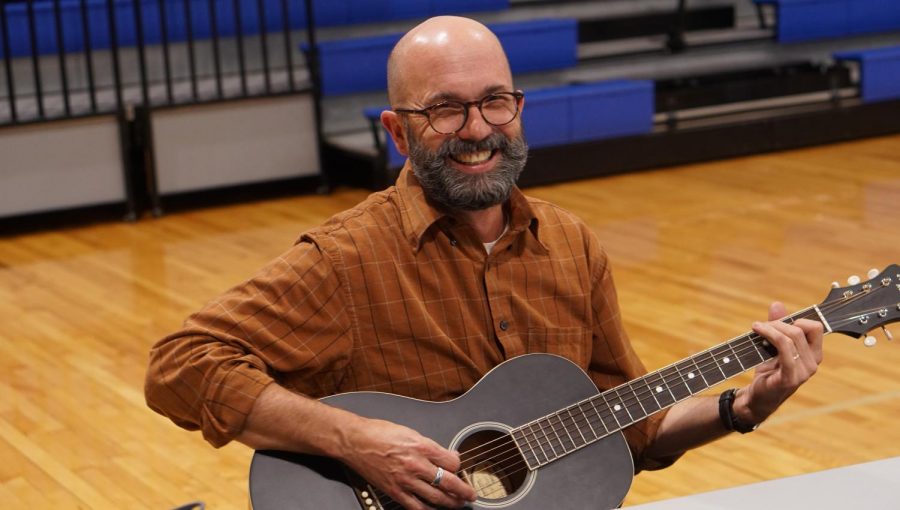
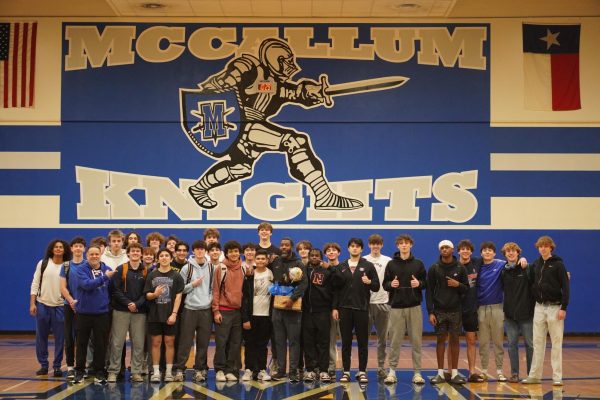
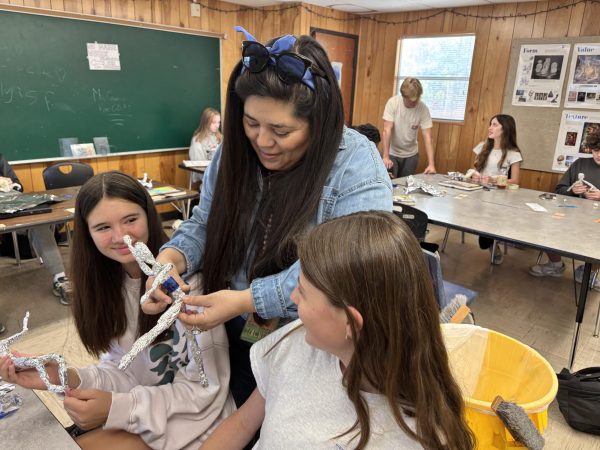

![This is Paul Pew's high school graduation photo. The 2023-2024 school year marked his 34th year of teaching. He began his career in Washington, then came to McCallum where he has taught for the past 17. At heart though, he’s really a musician. One that grew up in many different places, including Chicago and California, who took interest in teaching from a young age. His high school choir experience, along with some international singing in college, persuaded him that teaching was his path. He knew he wanted to be able to help create works of art in the fine arts department as well, so he joined McCallum. He’s worked on many of the musicals over the years, even before Joshua Denning, the former theatre director of the fine arts program arrived. Before him was a different director: Tatum.
“I was the music director for all the musicals,” Pew said. “[Mr. Tatum and I] worked very hard, and I just got to the point where I was satisfied with it.” Although he may not be as prominent of a member in the musical theatre community at McCallum anymore, he still plays piano. “I still do a lot of music down at the Music end of the building,” Pew said. Photo courtesy of Paul Pew.](https://macshieldonline.com/wp-content/uploads/2024/07/Paul-Pew-1974-444x600.jpg)
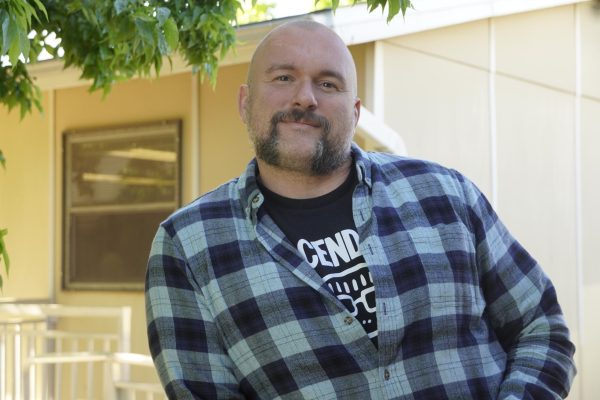
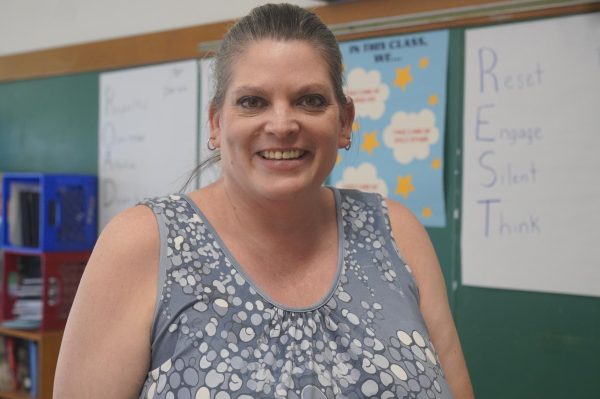

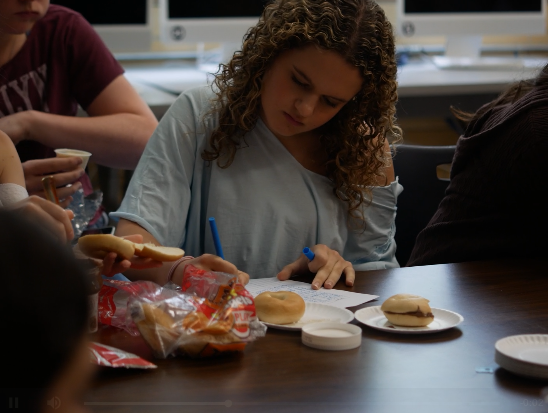
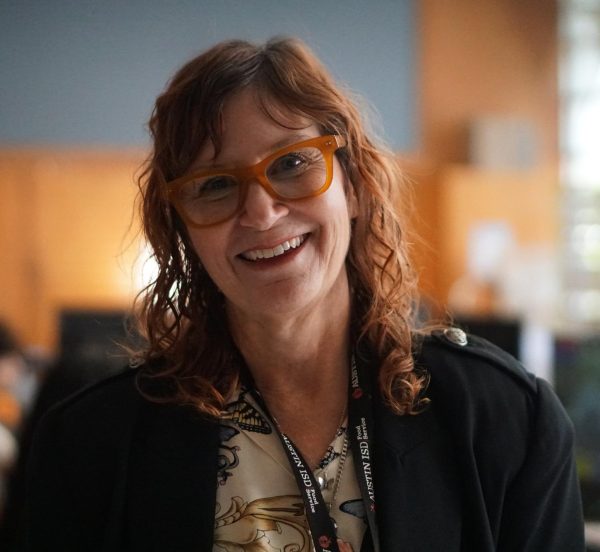

Michael Bates • Mar 2, 2021 at 7:54 pm
Way to go, Tom!
Jocelyn (Fuentes) Ybarra • Jun 20, 2020 at 9:09 pm
I loved having you as my Debate teacher at Austin High Mr. Watterson! Hope you enjoy your well deserved retirement.
susan backhaus • Jun 30, 2018 at 8:13 pm
Mr. Watterson, You will be truly missed!!! You were an awesome inspiration to many, especially my son. We wish the best to you!!!